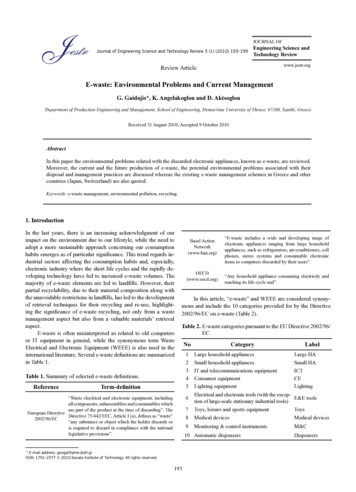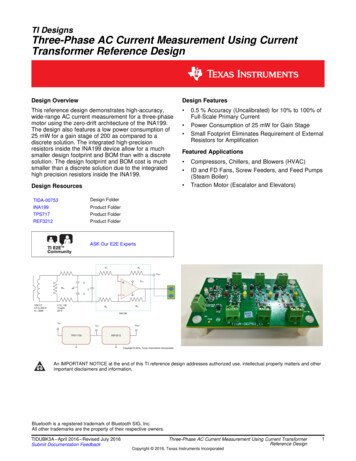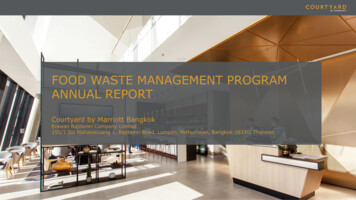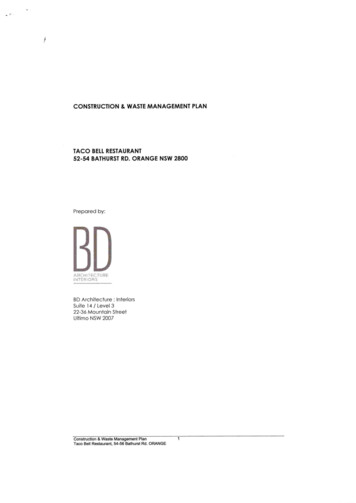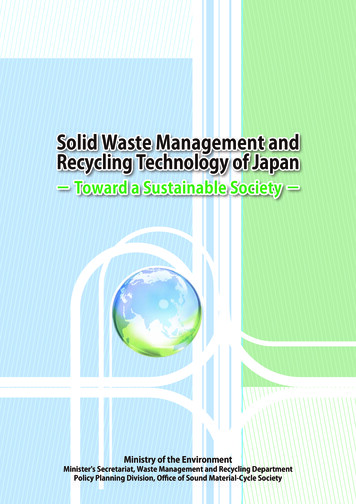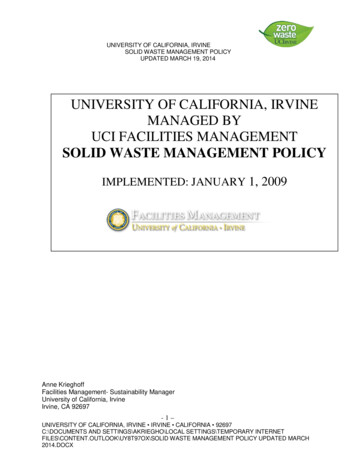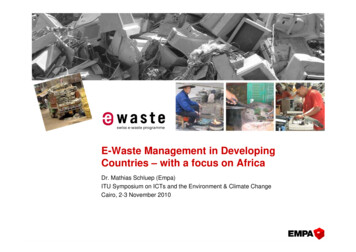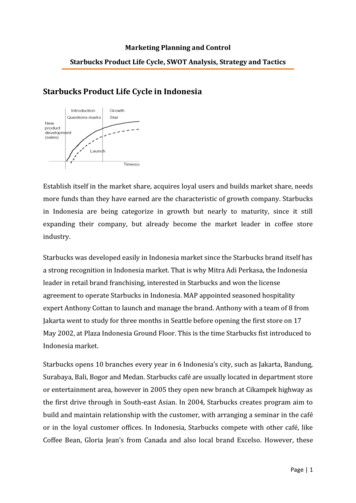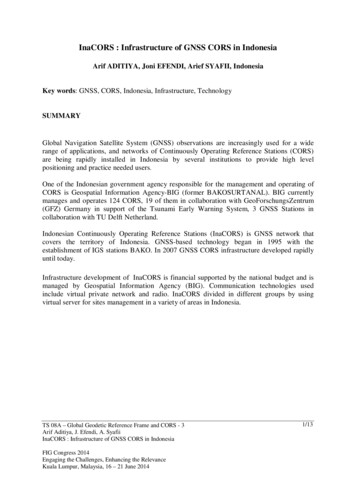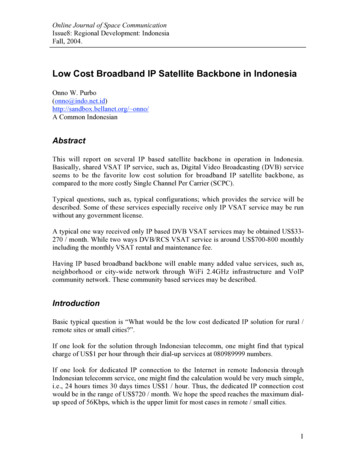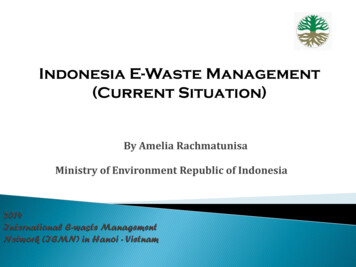
Transcription
Indonesia E-Waste Management(Current Situation)By Amelia RachmatunisaMinistry of Environment Republic of Indonesia
Current Status for Regulatory Framework : E-waste regulation follow the Hazardous Waste Management : under RepublicIndonesia Act No.32/2009 andGovernment Regulation No.18 year 1999Concerning The Hazardous Waste Management. Definition of Hazardous Waste (RI Act.No.32/2009 and Gov.RegulationNo.18/1999) : Hazardous and Toxic Waste hereinafter called B3 waste shall theresidue of a business and/or activity which contains B3(B3 is Hazardous and Toxic material hereinafter abbreviated to B3 shall besubstance, energy and/or other components which due to their nature orconcentration and/or quantity, both directly and indirectly can pollute and/ordamage the environment, health as well as the continuation of human life and ofother living creatures.) Since 2011 Indonesia still preparing the National Regulation on e-wasteManagement Despites of the progresses made by KLH, there are many other activities that needto be conducted for the draft regulation to become more sustainable and topromote environmentally sound management of e-waste in Indonesia. E – Waste Definition (on draft regulation) :All electronic and electrical equipment which are not functionand/or not being used as it’s original purpose
Indonesia still developing the specific e-waste regulation that cover ewaste from household and industry resources We need more data analysis for chemical content one-waste for further implementing technology for e-wastemanagement (current condition only collection, dismantling, andseparation) We need to build an incentive system to encourage electronicproducer doing EPR We need to coordinate with local governments We need to support coordination among electronic producer,refurshbishment/recondition company and local government on howto build collection point. Find the effective incentive mechanism remaining Indonesia has37 provinces with their very various condition We need to combined the e-waste mechanism collection andincentives system with the existing programme
Study on e waste as potential re-sources - West Java ; September 2013Existing ConditionOf E waste collection in West Java
Location of Study : Bandung, Kabupaten Bandung, Bekasi, Depok, Garut, e E wasteProduced1Cirebonmotherboard/CPU/PCB/IC computer,HP, TVInformalcollection1,2 B/IC computer,HP, TV, RadioCollection /CPU/PCB/IC computer,HP, TV, RadioInformalCollection &Proceses0,4 ton/activity/month4Depokmotherboard/CPU/PCB/IC computer,HP, TV, RadioInformalCollection CPU/PCB/IC computer,HP, TV, RadioInformal &FormalCollectionFormal: 150ton/activity/monthInformal: 0,3ton/activity/month6Garutmotherboard/CPU/PCB/IC computer,HP, TV, RadioInformalCollection &Proceses0,3 ton/usaha/bulan7Tasikmalayamotherboard/CPU/PCB/IC computer,HP, TV,InformalCollection &Proceses0,6 ton/activity/month
E-waste ProcessesFormal SectorInformal Sector1. Collection2. Dismantling3. Preparation Processes4. Processes1. Dismantling2. Preparation Processes3. Processes
Other Project:Indonesia E waste Study in Corporation with JICABackground : KLH has prepared a concept diagram and text of the e-wastemanagement regulation and shared them with JICAWorkshop on the e-waste management regulation in Indonesia(29 April 2014): Attending by various stakeholder attendance including.Active and positive discussion was conducted and various constructive views wereshown by the participants. JICA Team & KLH TeamSite Visit (30 April 2014) :1. Visit the e waste collection facilitiy in Cikarang Bekasi,PT. Citra Asia Raya (Already has permit for Collection of e waste from MoE)2. Visit one of the big retailer Shop in Indonesia, Electronic Solution : Electronic solution has the trade in program for the whole years ,They give the ewaste to the third party (sister company of ES) All traded e-waste are sent to storage building in Ciracas (East Jakarta) for storagebefore sold tentatively every week The Price range for e-waste depending on the various of e-waste.
Outcome of April 2014; E-Waste Stakeholder WorkshopOther Project Continued Effective primary collection method Further identifying the stakeholders responsibilities Fee mechanism for sustaining the e-waste management mechanism. It needs to enhance the general recognition of the e-waste issues widely andto promote effective awareness raising activity were also noted. It was highly noted that training workshop or seminar could be effective tofurther identify the necessary activities and prioritize the most needed onesalong with the learning the lessons from the existing international practicesfor effective development of e-waste management in Indonesia. Aforementioned training workshop or seminar could be heldorder to learn the lessons from the ongoing e-wasteframework development in neighbor countries and otherpractices among the officers in charge who develop e-wastemechanism in the region.regionally inmanagementinternationalmanagement
TERIMA KASIHTHANK YOU VERYMUCHFurther Information :Assistant Deputy of Verification onHazardous Waste Management Unit - Deputi IV KLHC Bld, 2nd Fl – Jl. D.I. Panjaitan Kav.24, JakartaTelp/Fax : 62-021-85911114/8514763Website: b3.menlh.go.idEmail:rachmatunisa@yahoo.com
Indonesia still developing the specific e-waste regulation that cover e-waste from household and industry resources We need more data analysis for chemical content on e-waste for further implementing technology for e-waste
